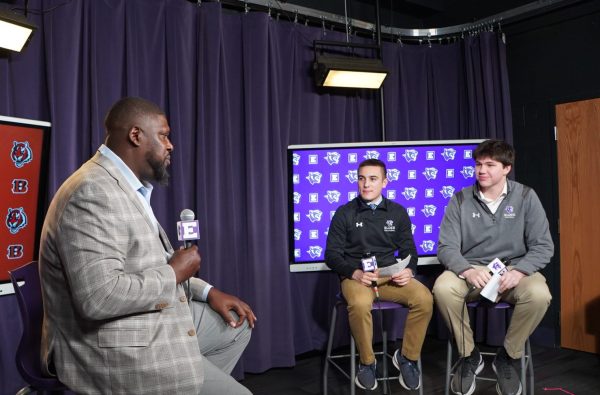Clowning around sends serious students into the background
Learn what do you’re fellow panthers think about clowning around in the classroom.
Class clowns have been a part of American schools for decades now, with students interrupting class and making teacher’s stress levels climb higher and higher. But what affect does clowning around in the classroom have on the other students in the class? I began by interviewing teachers and students from our Elder family to answer this question, only to get conflicting views on the subject.
As a senior who has spent the last four years wearing the purple polo I’ve had my fair share of class clowns and seen different teachers dealing with these students in a multitude of ways with differing results. I figured that the teacher’s opinion on the matter would be universally negative, so I was surprised that the very first teacher that I interviewed had a different view on the subject.
Mr. Spencer, one of Elder’s World Cultures teachers and Cross Country coaches, said that he thinks that class clowns can be a duel edged sword, with the possibility of being a positive influence on the class as a definite possibility.
“At the right time and place, it can add a little bit to the class,” Spencer admitted as he racked his brain searching for the correct words to clearly convey his point.
This was an interesting view on the matter considering just how long Mr. Spencer has been at Elder and how many class clowns that he has no doubt had in his classroom over the years.
The students attending Elder have not been as forgiving as Mr. Spencer towards their fellow students, with many of them having harsh words to describe these clowns and their actions. One student that wished to remain nameless expressed to me his deep annoyance for a certain class clown in his French class. He complained that his involvement in the class had dropped because the teacher had to dedicate too much of his/her time to trying to keep the clowns under control.
One Elder student didn’t mind sharing his opinion along with his name for this article, freshman Kaleb Dettmer told me during an interview that the continuing talking and clowning has made it so that he can’t learn as well as he could.
“Some people never shut up,” Dettmer complained. “And when one starts up then they all start talking.”
Dettmer did agree that though he thinks that class clowns are annoying, he also realizes that it’s much less prevalent at Elder compared to his old grade school (which he asked to keep nameless).
With a more neutral position on the matter, senior Jordan Jacob shared his thoughts after he calmly thought upon the question for a minute.
“If the class is bad and the teacher isn’t good at his job then the clowns are a welcome distraction, but when I’m trying to learn and take notes it can be a major distraction.”
This more moderate position is an unusual one in this matter of humor and high tempers, with most students and teachers being mostly or fully for or against class clowns.
The poll on the online edition of the purple quill had a 60/40 split on whether or not a class-clown is funny, with the 60% taking the side that they are funny. This poll shows that a majority of voters did not view the clowns as an annoyance, but rather something that doesn’t do too much harm to the students. But this also shows that people are still pretty split on their views, with 40% of voters saying that clowns in the classroom are a real annoyance.
Class clowns are an issue at Elder, as well as any school in the country. In some cases they can lighten a situation and provide some humor to a class, but more often they are just distractions that harm the learning environment that teachers and faculty strive to provide for their students. This can be a helpful tool for education, but a tool can only be measured by its accomplishments, and class clowns are harmful to a large portion of the class’ attention and learning. With that in mind I think that it is safe to say that clowning around has serious repercussions.

Hey, my name is Alexander Rolfes. I am a first year writer and editor for The Purple Quill, in charge of the Arts and Entertainment stories in the print...














